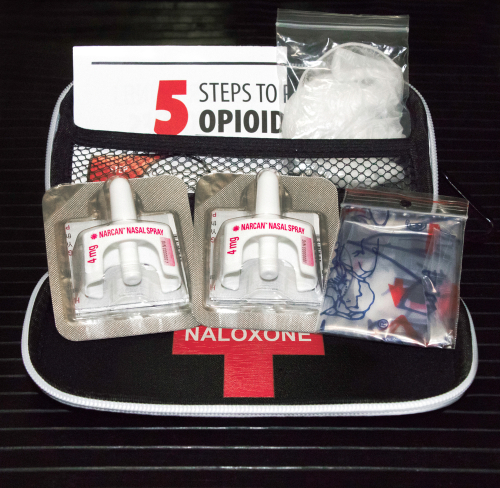
Naloxone hydrochloride kits — or Narcan kits for short — are helping the San Francisco Police Department (SFPD) stem an increase in opioid-related overdose deaths.
During the last five years, SFPD has partnered with the San Francisco Department of Public Health and the Harm Reduction Coalition’s Drug Overdose Prevention and Education (DOPE) Project to equip San Francisco police officers with the Narcan rescue kits.
“Narcan is proven to reverse the effects of an opioid overdose. When someone is experiencing an opioid overdose, time is a critical factor,” SFPD Public Information Officer Adam Lobsinger told Homeland Preparedness News. “Officers equipped with Narcan who can respond within minutes can be the difference between life and death.”
The SFPD in March 2015 launched the coordinated pilot program that put Narcan in SFPD vehicles patrolling the metropolitan area, Lobsinger said, and officers were trained on how to recognize life-threatening opioid overdoses from such drugs as heroin and prescription painkillers, as well as how to administer the intranasal Narcan as an antidote.
San Francisco police officers that first year successfully administered Narcan in three incidents. In 2016, officers successfully administered Narcan 21 times; 28 times in 2017; 74 times in 2018; and 135 times in 2019. So far, through July of this year, police officers have administered Narcan 148 times in the San Francisco metro area.
At the same time, though, increased opioid use has resulted in more overall overdose-induced deaths. For example, in 2018 there were 259 overdose deaths in San Francisco and 441 overdose deaths in 2019. Through September 2020, there have been 516 overdose deaths, according to the SFPD.
The San Francisco Department of Public Health (DPH) on Aug. 31 released data showing that “the very strong opioid fentanyl contributed to a sharp increase in overdose mortality in the city in 2019.”
“Though our city’s overdose death numbers have been steadily increasing since fentanyl became a staple in our street drug supply, it is because of the work of people who use drugs that more people survive their overdoses in San Francisco than pass away from them,” said DOPE Project Manager Kristen Marshall.
DPH funds expanded naloxone distribution and training through the DOPE Project, which in 2019 furnished more than 47,000 doses of injectable naloxone and more than 5,000 nasal naloxone kits in San Francisco. The DOPE Project also has trained more than 15,000 San Franciscans on how to identify and respond to overdoses.
While 441 San Franciscans were lost to overdose in 2019, community members were able to reverse at least 2,600 overdoses with naloxone, while San Francisco paramedics responded to nearly 2,000 overdose incidents in which naloxone was used, according to DPH.
“People who use drugs, people experiencing homelessness, and frontline harm reduction workers successfully reversed at least 2,600 overdoses in 2019 and more than 1,600 so far in 2020,” Marshall said. “Even during a pandemic, this community is saving lives and working to address the root causes of overdose like homelessness, poverty and systemic racism.”
SFPD’s Lobsinger added that prompt screening and assignment of 9-1-1 calls by the San Francisco Department of Emergency Management dispatchers and early intervention by SFPD officers equipped with Narcan kits, combined with skilled care and transport by paramedics to an emergency room, all increase the chances of survival for an overdose victim.
“The COVID-19 pandemic has had minimal impact on the Narcan program,” Lobsinder said. “Since the outbreak of the pandemic, officers are required to wear additional personal protective equipment to calls for service. Any increase in calls for service will see an increase in need of PPE. The SFPD has not experienced a shortage in PPE.”
Recognizing the success of the naloxone program, Lobsinger said it was expanded department-wide in April 2017, and all SFPD patrol vehicles now are equipped with Narcan kits.

